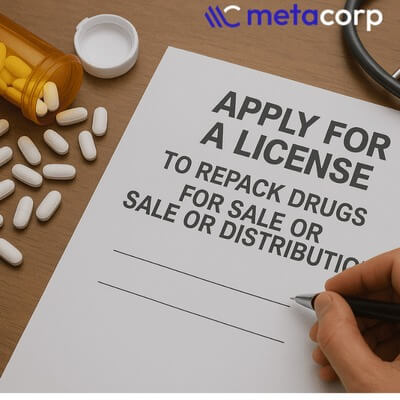
The Indian pharmaceutical industry stands as a global leader, not only meeting the healthcare needs of its vast population but also serving as a trusted supplier of medicines across international markets. Given the critical role that pharmaceuticals play in safeguarding public health, the sector operates under a stringent regulatory framework established by the Drugs and Cosmetics Act, 1940, and the accompanying Drugs and Cosmetics Rules, 1945.
Within this regulatory structure, multiple categories of licenses exist to govern manufacturing, repacking, and distribution activities. One important category is the license for repacking drugs intended for sale or distribution. This license is specifically applicable to medicines outside the purview of Schedules C and C (1) and explicitly excludes drugs classified under Schedule X, which primarily cover controlled narcotic and psychotropic substances.
A repacking license is a regulatory approval required by businesses or firms that wish to purchase bulk drugs or medicines and repack them into smaller quantities/pack sizes for further sale or distribution. This ensures that medicines remain safe, properly labeled, and traceable through the supply chain.
Such licenses are often obtained by wholesalers, distributors, and pharmaceutical companies that operate in secondary packaging rather than direct manufacturing.
Applicants seeking a repacking license must fulfill the following conditions:
The application process requires a detailed set of documents to demonstrate compliance. Below is the simplified one-liner checklist:
1. Covering Letter – Formal request to Licensing Authority.
2. Power of Attorney – Authorization for the applicant/signatory.
3. Site Plan & Layout – Building plan as per Schedule-M requirements.
4. Premises Proof – Ownership, lease, or allotment documents.
5. Pollution Control Consent – Approval from State Pollution Control Board.
6. Firm Constitution Proof – ROC certificate, partnership deed, or trust deed.
7. List of Technical Staff – Names, qualifications, and experience.
8. Appointment Letters – For manufacturing and testing staff.
9. Plant & Machinery List – Section-wise equipment details.
10. Industrial Safety NOC – Approval from Safety & Health Department.
11. HVAC and Water Certificates – Validation of essential systems.
12. Site Master File – Detailed description of facility and operations.
13. SOPs/STPs – Standard Operating and Testing Procedures.
14. Declarations – Undertakings from technical staff and directors.
15. Test License (Form 29) – If applicable.
16. Source & COA of Bulk Drugs – Supplier information with Certificates of Analysis.
17. Master Formula & Procedure – Detailed repacking methodology.
18. Validation Reports – Process and analytical validation studies.
19. Finished Product Specifications – Standards including impurity profiles.
20. Batch Certificates & Stability Data – Reports from at least three batches.
21. Comparative Studies – Dissolution or equivalence studies, if required.
22. Label & Carton Drafts – Specimen designs of product packaging.
23. Bio-Equivalence Data/Waiver – Where applicable.
24. New Drug Approval – If repacking involves a new drug.
25. Undertakings & Forms – Including Form 51 and duly filled Form 24-B.
26. Fee Payment Proof – Challan or receipt of statutory fees.
These documents collectively prove that the applicant has the necessary infrastructure, technical knowledge, and compliance framework to handle repacking responsibly.
Obtaining a repacking license is a structured process that ensures only compliant businesses are authorized to operate. The key steps include:
1. Document Compilation – Gather all required documents such as site layout, proof of premises, technical staff details, and other enclosures specified under the checklist.
2. Submission of Application (Form 24-B) – File the application along with prescribed government fees to the respective State Drug Licensing Authority.
3. Regulatory Review & Site Inspection – The Drug Inspector or concerned officer conducts a detailed examination of documents and inspects the facility to verify compliance with statutory standards.
4. Addressing Observations – In case of shortcomings or queries raised during inspection, the applicant must resolve them within the given timeframe.
5. Issuance of License – Once the authority is satisfied with compliance, the repacking license is formally granted in Form 25 (B), permitting the applicant to commence operations.
Holding a repacking license is more than a legal requirement—it offers multiple advantages:
The Repacking License, issued in Form 25-B, is a vital authorization for businesses engaged in the secondary packaging and distribution of medicines in India. By regulating this process, the government ensures that drugs remain safe, accurately labeled, and fully traceable from the manufacturer to the end consumer.
For applicants, obtaining this license is not just a statutory requirement but also a demonstration of their commitment to quality, compliance, and patient welfare. With the right documentation, adherence to Schedule M standards, and proper technical supervision, the licensing process can be navigated smoothly.
For more details, please click HERE





We are the pioneers in offering environmental consulting services to our patrons, giving us the first mover advantage & keeping us ahead of our competitors.
Very experienced in filing, monitoring & submission of CDSCO Compliances, Drugs Manufacturing & sale guidelines, Environmental Impact Assessment, AERB consulting services, Pollution Control Board CTE & CTO Advisory Services, Waste Management Authorization from State Pollution Control Boards, Fertilizers & Insecticides Manufacturing, Wholesale & Import Compliances
